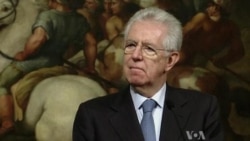ROME —
Italy is in a political deadlock following an election late last month that left parliament divided almost equally among three factions. Meanwhile, the country’s economic crisis continues, threatening the stability of the eurozone.
Italians surprised the world, and perhaps themselves - splitting their vote among disgraced former Prime Minister Silvio Berlusconi, a center-left coalition and a protest movement led by a former comedian. The current prime minister, an economist praised by the international community, got only 10 percent of the vote.
Retired couple Gabriella Magini and Mario Pezzella were as surprised as anyone. They worry about their finances, and even more about their grandchildren.
“If I think of the future, I’m not terribly optimistic, no. I think uneasiness is the most spread out feeling all over Italy,” she said.
And there is good reason for concern. Unemployment is nearly 12 percent. Italy has had virtually no economic growth for more than 10 years. It struggles to pay the interest on its huge debt and it needs extensive reforms to make it competitive again. And now, the parliament is deadlocked.
“This is, I think, the worst outcome, the worst scenario that we could have hoped for," said economics professor Nicola Borri.
He says even if a government is formed it will not have the power to take the necessary steps to revive the Italian economy and end talk of a collapse of the 17-nation euro system.
“We could find ourselves in a situation in which it’s really hard, politically, to service our debt. And, you know if Italy decides not to service its debt anymore, I think that the euro zone is over,” said the professor.
European leaders are determined not to let that happen. And at least one longtime Italian analyst, Andrea Margelletti, believes his country will get through this economic, and now also political, crisis.
“We have to study the results and to find a good, I may say, way to find an ‘Italian Solution,” he said.
Such optimism does not impress Professor Borri.
“When we say ‘Italian Solution,’ we mean some agreement that doesn’t deliver any reforms. So, if that is an ‘Italian Solution,’ personally, I don’t like it.” he said.
And neither do Gabriella and Mario, who have seen their pensions frozen while prices go up, squeezing even relatively well-off people like them.
“It has been an awful surprise for us, for the majority of people,” said Gabriella.
“I hope in the future. I think the Italian people are so strong, so intelligent, to solve the crisis,” said Mario.
But that is more difficult than ever now, with a paralyzed parliament. No one expects much progress at least until after new elections, which could come before the end of the year.
Italians surprised the world, and perhaps themselves - splitting their vote among disgraced former Prime Minister Silvio Berlusconi, a center-left coalition and a protest movement led by a former comedian. The current prime minister, an economist praised by the international community, got only 10 percent of the vote.
Retired couple Gabriella Magini and Mario Pezzella were as surprised as anyone. They worry about their finances, and even more about their grandchildren.
“If I think of the future, I’m not terribly optimistic, no. I think uneasiness is the most spread out feeling all over Italy,” she said.
And there is good reason for concern. Unemployment is nearly 12 percent. Italy has had virtually no economic growth for more than 10 years. It struggles to pay the interest on its huge debt and it needs extensive reforms to make it competitive again. And now, the parliament is deadlocked.
“This is, I think, the worst outcome, the worst scenario that we could have hoped for," said economics professor Nicola Borri.
He says even if a government is formed it will not have the power to take the necessary steps to revive the Italian economy and end talk of a collapse of the 17-nation euro system.
“We could find ourselves in a situation in which it’s really hard, politically, to service our debt. And, you know if Italy decides not to service its debt anymore, I think that the euro zone is over,” said the professor.
European leaders are determined not to let that happen. And at least one longtime Italian analyst, Andrea Margelletti, believes his country will get through this economic, and now also political, crisis.
“We have to study the results and to find a good, I may say, way to find an ‘Italian Solution,” he said.
Such optimism does not impress Professor Borri.
“When we say ‘Italian Solution,’ we mean some agreement that doesn’t deliver any reforms. So, if that is an ‘Italian Solution,’ personally, I don’t like it.” he said.
And neither do Gabriella and Mario, who have seen their pensions frozen while prices go up, squeezing even relatively well-off people like them.
“It has been an awful surprise for us, for the majority of people,” said Gabriella.
“I hope in the future. I think the Italian people are so strong, so intelligent, to solve the crisis,” said Mario.
But that is more difficult than ever now, with a paralyzed parliament. No one expects much progress at least until after new elections, which could come before the end of the year.





